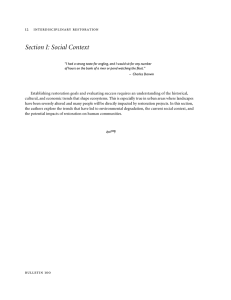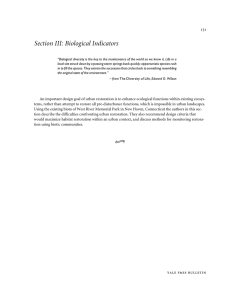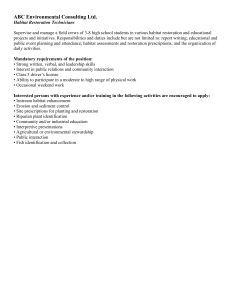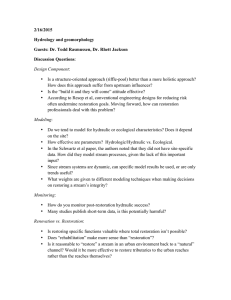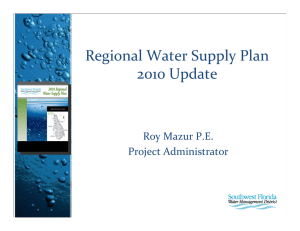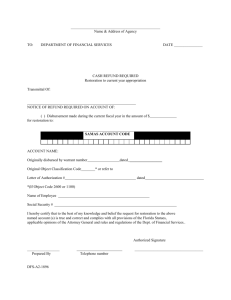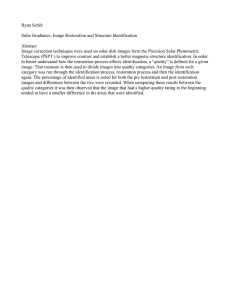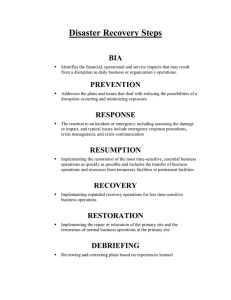323 N Plum Avenue, Bozeman, MT 59715 Email: restoringrivers
advertisement
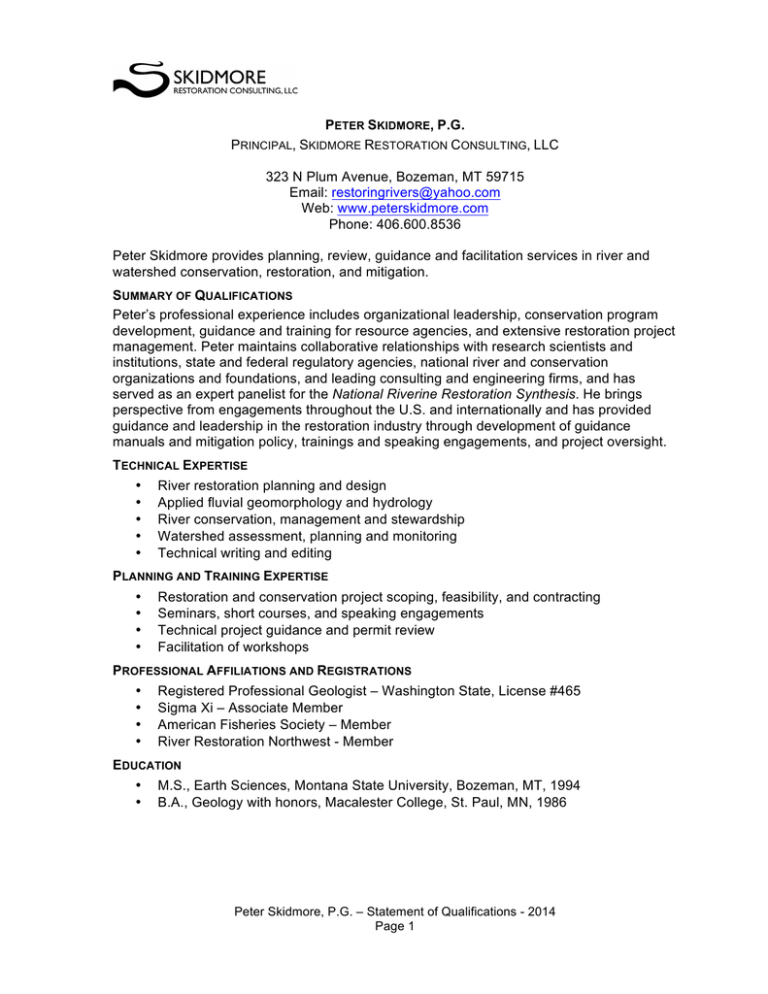
PETER SKIDMORE, P.G. PRINCIPAL, SKIDMORE RESTORATION CONSULTING, LLC 323 N Plum Avenue, Bozeman, MT 59715 Email: restoringrivers@yahoo.com Web: www.peterskidmore.com Phone: 406.600.8536 Peter Skidmore provides planning, review, guidance and facilitation services in river and watershed conservation, restoration, and mitigation. SUMMARY OF QUALIFICATIONS Peter’s professional experience includes organizational leadership, conservation program development, guidance and training for resource agencies, and extensive restoration project management. Peter maintains collaborative relationships with research scientists and institutions, state and federal regulatory agencies, national river and conservation organizations and foundations, and leading consulting and engineering firms, and has served as an expert panelist for the National Riverine Restoration Synthesis. He brings perspective from engagements throughout the U.S. and internationally and has provided guidance and leadership in the restoration industry through development of guidance manuals and mitigation policy, trainings and speaking engagements, and project oversight. TECHNICAL EXPERTISE • • • • • River restoration planning and design Applied fluvial geomorphology and hydrology River conservation, management and stewardship Watershed assessment, planning and monitoring Technical writing and editing PLANNING AND TRAINING EXPERTISE • • • • Restoration and conservation project scoping, feasibility, and contracting Seminars, short courses, and speaking engagements Technical project guidance and permit review Facilitation of workshops PROFESSIONAL AFFILIATIONS AND REGISTRATIONS • • • • Registered Professional Geologist – Washington State, License #465 Sigma Xi – Associate Member American Fisheries Society – Member River Restoration Northwest - Member EDUCATION • • M.S., Earth Sciences, Montana State University, Bozeman, MT, 1994 B.A., Geology with honors, Macalester College, St. Paul, MN, 1986 Peter Skidmore, P.G. – Statement of Qualifications - 2014 Page 1 PROFESSIONAL EMPLOYMENT SUMMARY Skidmore Restoration Consulting, LLC (Montana) 2007 - Present • Principal. River and watershed conservation, restoration, and mitigation planning. Guidance, policy development and oversight for federal, state, and local resource agencies and conservation organizations and foundations. The Nature Conservancy (Washington) 2003-2007 • Freshwater Program Manager. Freshwater program development, conservation planning, and project oversight. Development of statewide assessment, strategic plan, and program elements for regional freshwater conservation. Inter-Fluve, Inc. (Montana, Michigan, Washington) 1994-2003 • Board of Directors. Strategic planning and development focused on expansion into new markets for river restoration and engineering design firm. • Executive Management. Development and management of regional office (Seattle). Business development, project oversight, and strategic planning. • Senior Associate. Project and client management and design and construction oversight on river restoration projects throughout U.S. with fee budgets of up to $350k and construction budgets of over $1m. U.S. Forest Service, Gallatin National Forest (Montana) 1993 • Watershed Hydrologist – Watershed restoration plan development. Montana State University (Montana) 1991-1993 • Research Associate – Instruction and research in watershed hydrology. National Outdoor Leadership School (Alaska and Wyoming) 1989-1991 • Course Leader – Wilderness and Outdoor Educator Courses. Proctor Academy (New Hampshire) 1989-1990 • Course Leader – Mountain Classroom Program. Kimball Union Academy (New Hampshire) 1987-1989 • Teacher – Earth Science and Physics, Dorm Parent, Ski Coach. Bay West, Inc., (Minnesota) 1986-1987 • Hydrogeologist – Groundwater monitoring and analysis. NON-PROFIT BOARD SERVICE Montana Aquatic Resources Services, Board of Directors, founding member River Restoration Northwest, Board of Directors, Vice President Greater Gallatin Watershed Council, Board of Directors, Chair Gallatin Valley Land Trust, Board of Directors, Chair of Lands Committee 2011-present 2008-present 2009-2011 1998-1999 PROFESSIONAL TRAINING • • • • • Stream Project, Decision Analysis and Design Guidance, RRNW (WA) Streambank Stability and Bank Stabilization Measures, ASCE (Reno, NV) River Restoration Project Design Short Course, EWRI (Orlando, FL) Hydraulic Design of Stable Channels Using SAM (Milwaukee, WI) Glacial and Environmental Research Program (Juneau, AK) Peter Skidmore, P.G. – Statement of Qualifications - 2014 Page 2 2012 2001 2001 2000 1986 SELECTED PROJECT EXPERIENCE Story Mill Wetland and Stream Restoration, MT. Provided restoration planning technical guidance and oversight to the Trust for Public Land (TPL) for the Story Mill park and nature preserve at the confluence of Bozeman Creek and the East Gallatin River. Assisted in development of restoration goals and objectives with stakeholder input, guided TPL in project scoping and contracting, and provided oversight of TPL design consultants including technical review of all contract and design deliverables. 2013 and ongoing. Colorado River Basin Restoration Measures, CO, UT, AZ, NV and Mexico. Principal investigator in development of a framework for measuring progress and success of basinwide riparian and environmental flows restoration. Collaborated with Walton Family Foundation staff, grantees and partners to establish specific restoration targets that define the restoration goals of watershed restoration partnerships supported by the Foundation. Established riparian restoration and environmental flows targets for seven Colorado River tributaries and the Colorado River delta in Mexico. Provided granting and strategy guidance and advice to the Foundation. 2013 and ongoing. Deep Creek Watershed Restoration Plan, MT. Developed management guidelines and restoration priorities to improve water quality, restore habitat, and provide long-term protection of property along 22 miles of Deep Creek. Performed geomorphic assessment to identify channel evolution trends and causes of habitat and water quality degradation. Engaged an advisory council of landowners and resource agencies to identify restoration opportunities and constraints. Presented findings to diverse group of community stakeholders through an educational and open dialogue and provided assistance in grant proposals to fund recommended strategies. projects. 2013. Stream Mitigation Assessment Framework, OR. Principal investigator in development of an assessment framework and protocol for stream mitigation in the State of Oregon for the US EPA, Region 10. Provided a synthesis of the state of the science and facilitated technical workshops to solicit information and establish interagency collaboration. Developed a draft stream function assessment framework, recommendations for performance standards and site selection criteria to improve assessment of streams as the basis for compensatory mitigation under the Clean Water Act Section 404 permit program. Developed a statewide stream classification framework and assessment protocol to serve as foundation for functional assessments. Collaborated with EPA, Oregon Department of State Lands, the U.S. Army Corps of Engineers, and the Willamette Partnership. 2012, ongoing. Bozeman Creek Enhancement Plan, MT. Provide technical oversight as member of steering committee for development of a long-term enhancement plan for Bozeman Creek through Bozeman, MT. Provided guidance on planning process including development of a vision statement, goals and objectives, contributed technical input to plan elements and facilitated discussion groups to solicit public input. Participation in ongoing development of a master plan including prioritization of specific community-supported restoration actions to improve water quality, habitat, recreation and access, and to enhance the stream corridor as a central amenity for the community. Conducted technical review and recommendations in selection, contracting, and oversight of design development for restoration and enhancement projects. 2012. Peter Skidmore, P.G. – Statement of Qualifications - 2014 Page 3 Washington Stream Habitat Restoration Guidelines, WA. Lead Author and Training Presenter. Managed a multi-disciplinary and multi-organization team to update the Washington Stream Habitat Restoration Guidelines (SHRG), originally published in 2004 as part of the state Aquatic Habitat Guidelines project. SHRG is a guide to planning, design and ecological considerations for stream habitat restoration. Authored key sections and edited and managed input from other authors, collaborating with state and federal agencies in an iterative editorial process. Provided trainings at multiple venues in Washington. 2012. RiverRAT: River Restoration Analysis Tools and Training. WA, OR, CA, ID. Project manager and principal author in conjunction with the NOAA Fisheries and the U.S. Fish and Wildlife Service scientists. Developed resources and tools to assist resource agencies in the review of proposed restoration and stabilization projects, specifically in the ESA context of recovery of listed salmonid species. Resources include a synthesis of the science of river and watershed processes as they influence river habitat and the science and practice of restoration; a web-based project evaluation tool to promote consistent and thorough review of proposed restoration or stabilization projects and to facilitate determination of potential habitat effects. Developed and convened expert workshops, peer review, and thorough vetting with potential end users from multiple state and federal agencies. Developed and led RiverRAT trainings for federal and state resource agency staff and to governmental and non-governmental funding institutions, 2009, with trainings 2009 – 2012. Fisher Slough Restoration and Monitoring Plan, WA. Served as representative of The Nature Conservancy in review and oversight of contracted services to develop, conduct and report on a comprehensive monitoring plan for the Fisher Slough Restoration Project. Established a monitoring framework that created logical links between project goals and objectives to specific ecological measures and monitoring protocols. Provided guidance to TNC in selection, contracting, and design oversight for restoration designs leading to implementation. Fisher Slough is a freshwater tidal estuary, tributary to the Skagit River in Washington. 2011. Johnson Creek - Willamette River Confluence Salmon Habitat Enhancement Project, OR. Provided guidance and review to the Johnson Creek Watershed Council on Request for Proposal documents. Assisted The Johnson Creek Watershed Council with development of project goals and objectives, defining scope of work for preliminary and final design, permitting, and construction services, and developing project timeline and budget. The Johnson Creek confluence supports salmon juvenile rearing and adult migratory habitat in an urban setting for federally listed Chinook, Coho, and steelhead in the Columbia River basin. 2011. Missouri River Ecosystem Restoration Plan (MRERP), MT, ND, SD, NE, IA, KS, MO. Facilitator and River Conservation Planner, contracted with Army Corps of Engineers in partnership with US Fish and Wildlife Service to facilitate development of the Missouri River Ecosystem Restoration Plan and Environmental Impact Statement, a long-term study authorized by the Water Resources Development Act of 2007 (WRDA 2007). The WRDA mandate includes: mitigate losses of habitat, recover listed species, and restore the ecosystem to prevent further declines of native species associated with Army Corps management of six mainstem dams. Collaborated in development of conservation planning process modeled after Nature Conservancy Conservation by Design framework, facilitated Peter Skidmore, P.G. – Statement of Qualifications - 2014 Page 4 Cooperating Agencies Team participation and Technical Team review, and developed specific planning objectives and ecological targets. 2009-2010. Upper Missouri River Basin Pallid Sturgeon Habitat Conservation and Restoration Plan, MT, ND. Principal investigator in synthesis of current state of knowledge of habitat constraints affecting pallid sturgeon recovery (endangered species listing), and recommendations for research programs to address gaps and conservation and restoration strategies to facilitate recovery. Identified a portfolio of logical management actions, strategies, and programs to mitigate existing and potential habitat constraints and recommended high priority restoration and management actions essential for recovery. Planning included the establishment of a GIS framework for identification and evaluation of sturgeon habitat restoration and conservation priorities. 2009. Hellroaring Creek Restoration, MT. Provided consultation and guidance on feasibility, alternatives evaluation, project scoping, and design contracting to project owner for restoration of a stream crossing an alluvial fan that has been impacted by a century of grazing and constraints imposed by irrigation diversions and road crossings. Provided guidance in project sequencing, performed site review, reviewed and edited owner’s solicitations for project design proposals, reviewed proposals submitted by consultants, and evaluated implications of proposed designs and approach. 2008. Environmental Flows Research Partnership, WA. Established a partnership and research program among the University of Washington, The Nature Conservancy, NOAA Fisheries, and the U.S. Geological Survey to develop tools for watershed planning that promote effective management of instream flows in Washington rivers. Program was developed in collaboration with state agencies responsible for management of instream flows and with broad support from tribes and environmental organizations. Developed a work and research plan, lobbied for funding and support with state legislators, and secured funding for initial phase of program. 2007. Washington Statewide Freshwater Conservation Assessment, WA. Principal investigator, project manager, and author. Conducted comprehensive data compilation and analysis of freshwater species at risk, watershed impacts, and threats to freshwater biodiversity across Washington State to identify priority conservation opportunities and strategies. The statewide assessment was developed in conjunction with and derived from data developed for Nature Conservancy Ecoregional Assessments for all ecoregions spanning Washington. Conducted outreach and training for state and federal agencies, county and watershed planning groups, and non-governmental organizations with watershed and conservation mandates. Enlisted and facilitated Advisory Board of experts from regional research institutions and state and federal agencies, including NOAA Fisheries, to provide guidance and peer review. Assessment products include comprehensive report and appendices, brochure, and data and interactive map CD. Assessment is currently being used by wide range of governmental and non-governmental organizations to facilitate watershed and conservation planning, and serves as the basis for the Nature Conservancy’s strategic conservation planning in Washington. 2006. Fisher Slough Restoration, WA. Provided restoration guidance and oversight for stream and estuarine Chinook salmon habitat restoration. Developed project vision, scoping and contract documents, provided technical oversight of contractor’s design and monitoring plans, and provided project consultation for grant funding applications. The Fisher Slough Peter Skidmore, P.G. – Statement of Qualifications - 2014 Page 5 restoration project involves re-creation of naturally functioning stream and estuarine processes within a complex system of infrastructure elements including dikes, ditches, floodgates, county and federal roads and a railroad. Project development involves diverse partners and management of a Technical Advisory Committee including Tribal, diking district, irrigation district, conservation, and watershed groups. 2006. Silver Creek, ID. Provided guidance on behalf of project owner in development of restoration goals and objectives and project scoping and assisted with contracting for restoration feasibility and plan on Nature Conservancy property. Project objectives include naturalization of a reach of Silver Creek, a blue ribbon spring creek trout fishery, to address sedimentation and temperature impacts while maintaining an irrigation diversion. 2006. Big Hole River, MT. Site review and project scoping for restoration of a multi-thread channel degraded by irrigation withdrawals and return and cattle grazing. Reviewed contractor’s proposed restoration designs on behalf of project owner. The Big Hole River is one of two river systems in Montana with populations of arctic grayling, a candidate species. 2006. McCartney Creek Restoration, WA. Development of restoration vision, goals and objectives, scoping and contracting for restoration design, and establishment of a monitoring agreement with NOAA Fisheries. McCartney Creek, a tributary to the Columbia River, includes a 3,000’ channelized and degraded reach through Nature Conservancy preserve and is home to redband rainbow trout. Restoration goals include integration of planned preserve science and learning center and upland and terrestrial conservation objectives. 2006. Classification of Freshwater Systems of Sulawesi. Indonesia. Developed a watershed classification of freshwater ecological systems for Sulawesi, a large island in Indonesia. Classification was performed at multiple scales to inform conservation planning by The Nature Conservancy and its partners. Classification required extensive field reconnaissance, interpretation and manipulation of GIS data, peer input and review, and production of a classification system in a GIS format. 2005. Washington Stream Habitat Restoration Guidelines, WA. Project Manager. Managed a multi-disciplinary team of consultant and agency authors to create the Washington Stream Habitat Restoration Guidelines (SHRG) as part of the state Aquatic Habitat Guidelines project. SHRG is a guide to planning, design and ecological considerations for stream habitat restoration. Authored key sections, edited and managed input from other authors, and coordinated graphics, as well as collaborating with state and federal agencies in an iterative editorial process. The SHRG includes methods for restoring the natural supply of sediment, water, and woody debris to the stream; water quality; habitat connectivity; and habitat diversity. 2004. Beaver Creek, WA. Project Manager and Principal Investigator. Performed an analysis of bank stabilization alternatives to address bank erosion that was threatening a sanitary sewer line and residential structure. Analysis included geomorphic reach assessment, stakeholder interviews, evaluation of permitting requirements, conceptual plan development, and cost estimation for four bank stabilization alternatives. Presented alternatives and recommendations to council in a public meeting format. Prepared plans and specifications and provided construction inspection for log cribwall structure with habitat elements. 2003. Peter Skidmore, P.G. – Statement of Qualifications - 2014 Page 6 Natural Channel Design Short Course, MT and WA. Course manager. Developed curriculum and content for 5-day course designed to provide restoration project owners and consulting biologists and engineers with understanding of natural river processes and engineering elements of channel design. Managed and coordinated logistics and team of instructors for courses offered in various locations throughout western states, with over 300 attendees from 1996-2001. Restoration Plan for Unnamed Stream, MI. Project Manager and Principal Investigator. Performed rapid response assessment of damages to brook trout stream resulting from the breach of a stormwater detention facility. Approximately 1 million gallons was released suddenly to a small trout stream, resulting in channel scour, bank erosion, and habitat and wetland damage. Prepared a restoration plan, plans and specifications, and supervised construction for all restoration activities, including reconstruction of damaged channel and repair of wetlands impacted by sedimentation. This project also included preparation of recommendations and conceptual plans for stormwater detention retrofit to minimize impacts to stream and wetlands. 2001. Washington Integrated Streambank Protection Guidelines, WA. Principal author and contributing editor for Integrated Streambank Protection Guidelines, produced by Washington Department of Fish and Wildlife. The guidelines provide discussion on reach and watershed factors contributing to bank instability, the impacts of bank stabilization, and numerous techniques for protecting stream banks from continued erosion. Discussion of techniques includes description, costs and materials, concept drawings, and benefits and impacts of implementation. 2000. Willow Creek, MT. Project manager. Maintained and monitored an automated stream gaging station to record continuous stream flow on a private fishing ranch. Developed rating curve to relate stage to discharge. Prepared annual reports for 4 years on stream flow as it relates to habitat for brown and rainbow trout and provided recommendations for management of irrigation withdrawals and return to promote over-wintering habitat and enhance angling opportunities. 1994-1999. American Fork, MT. Project Manager. Evaluated damage to stream channel and riparian cottonwood forest resulting from channelization of stream on three discontinuous reaches. Prepared restoration plans, submitted and secured necessary permits, and provided construction supervision for restoration of over 1,000 feet of channelized stream. 1999. Lower Nooksack River Meander Limit Study, WA. Project Manager. Evaluated meander limits developed by Whatcom County as part of a long-range flood hazard management plan. Meander limits were established to provide land use planning and management limits to meet multi-objective plans for flood hazard reduction and ESA requirements. Study included evaluation of limits with respect to 100-year flood limits, geomorphic and geologic controls, historic meander limits and geomorphic channel parameters. 1999. Silver Bow Creek Superfund Stream Restoration, MT. Project manager overseeing preliminary investigations, conceptual design development and final design for Superfund remediation and restoration of 5 miles of stream channel impacted by tailings contamination from mining. Preliminary investigations involved hydrologic, geomorphic, and sediment transport studies. Conceptual plans were developed to remove tailings impacted soils from Peter Skidmore, P.G. – Statement of Qualifications - 2014 Page 7 channel, banks and floodplain, requiring reconstruction of entire channel and associated floodplain. Conducted Pilot Test of five innovative bioengineered bank reconstruction practices and dewatering practices. 1999. Conservation District Technical Review, MT. Conceived and developed a program providing assistance to Montana Conservation Districts for evaluation of permits submitted for work within streams. Performed site reviews and evaluation of permit applications submitted to the State of Montana for work in stream channels. Provided permitting agency with opinions based on field review of designs submitted and of project merit in light of state laws governing projects within stream channels. 1997-1998. Taiwan Water Resources Bureau, Taiwan. Site review, project conceptualization, and educational workshops for development of multi-objective projects of the Taiwan Department of Water Resources that include flood control, bank stabilization, and aquatic resource conservation. 1998. Madison Spring Creek, MT. Project manager. Assisted private client with grant application for Future Fisheries program grant to restore a spring creek and enhance spawning habitat on a channel impacted by historic grazing. Developed channel restoration plans, riparian management plans, and supervised construction and creation of spawning channels. 1998. Rock Creek Restoration, MT. Project manager. Conducted a feasibility evaluation, oversaw the preparation of construction-ready plans and specifications, and provided construction oversight for the restoration of a two mile reach of an esteemed trout fishery on Forest Service lands in Montana affected by historic human channel manipulation. Feasibility evaluation incorporated conceptual designs, predicted outcome and budget estimates for three alternatives based on combinations of bioengineered stream bank stabilization, channel modification, reinstating an abandoned meander and knick point stabilization elements. Design included natural channel design, bioengineered bank reconstruction, and construction sequencing and plans and specifications. 1997. Whites Gulch Placer Mine Restoration, MT. Project Manager. Coordinated and designed a stream and floodplain restoration project for 3,000 feet of a placer mined drainage. Performed hydrologic, hydraulic and geomorphic investigations necessary for design and reconstruction of the stream channel and floodplain. Developed construction drawings and specifications for all phases of the project, coordinated geotechnical investigations and engineering considerations, produced construction bid package materials and provided construction oversight. 1996. Libby Area Conservancy District Long Range Flood Control Plan, MT. Project manager. Prepared a long-range plan to alleviate problems associated with flooding, including recommendations for structural and non-structural solutions to reduce flood damage, for improvement of water quality, improvement of fish and wildlife habitat and for procuring funding to implement recommendations. The plan preparation included meetings with residents, local agencies and organizations, a field assessment of existing watershed and stream conditions, land use impacts and past stream projects, evaluation of historic conditions from air photos and corporate and agency documents, research into opportunities for funding for recommended actions and the prioritization of project recommendations on the basis of cost-effectiveness. 1996. Peter Skidmore, P.G. – Statement of Qualifications - 2014 Page 8 Strawberry Aqueduct and Collection Reduced Flow Study Plan, UT. Developed a comprehensive study plan for the evaluation and mitigation of the effects of reduced flow regimes on five drainages for U.S. Forest Service. Extensive literature reviews were utilized to develop riparian and channel inventory, monitoring, and special study schemes. Areas of proposed detailed study included: forensic investigation of vegetation and hydrology; groundwater availability and plant indicator species; channel morphology trends; and potential for using beaver as a wetland mitigation tool. 1995. EXPERT TESTIMONY, TECHNICAL REVIEW AND PEER REVIEW City of Bozeman Integrated Water Resources Plan - Technical Advisory Committee. Provide review and guidance to evaluate and prioritize alternatives to address long-term and future water supply challenges. 2012 – 2013. Environmental Management – Peer Review. Provide peer review of publications for the journal Environmental Management. 2012-2014 and ongoing. Bozeman Creek Enhancement and Restoration Plan – Steering Committee. Provide guidance and review of comprehensive plan and select restoration and enhancement designs. 2010-2012. American Water Resources Association – Peer Review. Provide peer review of journal publications for the Journal of the American Water Resources Association. 2009. Washington State House of Representatives, Agriculture and Natural Resources, Work Session – testimony to legislators (WA). Developing flow management tools for watershed planning. 2007. Washington State Department of Ecology – Peer Review (WA). Stanley, S., J. Brown, and S. Grigsby. 2005. Protecting Aquatic Ecosystems: A Guide for Puget Sound Planners to Understand Watershed Processes. Washington State Department of Ecology. Publication #05-06-027. Olympia, WA. National River Restoration Science Synthesis - Expert panelist (CA). Served on panel of experts hosted by National Center for Ecological Analysis and Synthesis to assess the quality of the science underlying ecological restoration activities. 2002. Washington Channel Design White Paper (WA) – Editorial review (WA). Provided editorial review, managed draft revisions of “white paper” detailing the status of knowledge and understanding and additional research needs for field of natural channel design. 2001. Sand Creek Diversion and Remediation Project - Expert testimony (CO). Provided written expert testimony detailing probable costs for stream relocation and restoration related to petroleum product contamination of stream in Denver metropolitan area, in Conoco v. CRC, Case No. 00-CV-1018, Denver, Colorado. 2000. Peter Skidmore, P.G. – Statement of Qualifications - 2014 Page 9 Impacts of Riprap on the Yellowstone River - Expert testimony (MT). Provided written expert testimony in Montana Council of Trout Unlimited et. al. v. U.S. Army Corps of Engineers et. al., Case CV-99-059-BLG-JDF, District Court of Montana. 2000. Yellowstone River Cumulative Impacts Study – Peer review (MT). Provided Technical review of proposed cumulative impacts study during study design for U.S. Department of Natural Resources and Conservation. 1999. Conservation District Technical Review – Permit review (MT). Project manager and primary investigator. Provided technical review of riverbank stabilization and other river project permit applications for Conservation Districts in Montana. 1998-2000. TRAINING AND SEMINARS PROVIDED RiverRAT: River Restoration Analysis Tools (ID, WA, OR, CA, MT) Developed, facilitated and co-instructed series of 1- and 2-day trainings in the use of RiverRAT restoration project evaluation and project development tools. 2009-2013. SHRG: Stream Habitat Restoration Guidelines (WA) Co-instructed a series of 2-day trainings for the Coastal Training Program in the use and application of updated Washington Stream Habitat Restoration Guidelines. 2011. Washington Freshwater Assessment Workshops. Hosted and conducted series of workshops for Washington State and federal resource agency staff, regional environmental foundations, land trusts and non-profit environmental organizations to provide information and training in interpretation and analysis of freshwater biodiversity, watershed impacts, and future threats. 2007. Washington Stream Habitat Restoration Guidelines. Provided training workshop of methods and approaches to stream habitat restoration to biologists and engineers from state and federal agencies, tribes, and non-governmental organizations. 2002. Natural Channel Design Short Courses. Developed curriculum and course content, coordinated instructors and instructed 5-day short course on natural channel design for over 300 consultants, engineers, and regulatory agencies between 1996-2001. Flood Impacts and River Management on the Yellowstone River. Led field trip to view bank stabilization projects and discuss river management considerations for AWRA Summer Specialty Conference. 1999. Chinese Institute of Landscape Architecture, Taiwan. Seminar on bioengineering applications and channel design considerations in landscape architecture and natural channel design. 1998. Taiwan Water Resources Bureau. Presented seminar on water resources management approaches to flood management and providing aquatic resource and recreational values within river corridors. 1998. Peter Skidmore, P.G. – Statement of Qualifications - 2014 Page 10 Conservation District Stream Mechanics Workshops. Montana Department of Fish Wildlife and Parks. Developed and presented series of workshops on stream mechanics and river project permit review considerations for Conservation Districts throughout Montana. 19971998. Governor’s Yellowstone River Task Force. Presented seminar on stream dynamics and sediment transport implications for management of the Yellowstone. 1997. Montana Association of Conservation Districts. Presented seminar on bioengineering alternatives for bank stabilization on the Yellowstone River, MT. 1997. Montana Watercourse. Community workshop for watershed awareness and education. 1997. ORAL PRESENTATIONS Basin-scale Metrics for Riparian Habitat Restoration and Environmental Flows in the Colorado River Basin. River Restoration Northwest Symposium. 2014. Deep Creek Watershed Restoration Plan (MT). American Water Resources, Montana Chapter Annual Conference. 2013. Restoring River Ecosystems – Restoration Challenges and Planning for Success (MT). Montana Watershed Coordination Council, Summer Watershed Forum. 2012. Galileo’s Legacy Conference - Environmental Restoration: Benefits and Challenges (MO). Invited speaker, Restoring River Ecosystems. 2012. Montana Wetland Council (MT) Providing In-Lieu Fee Aquatic Resource Mitigation and Restoration. 2012. King County (WA) Planning Resources for Watershed and Stream Restoration. 2011. Salmon Recovery Conference (WA) Planning Resources for Instream Restoration. 2011. Trout Unlimited (via Webex) Principles of Successful Restoration and RiverRAT, Tools for Planning and Evaluating Stream Restoration Projects. 2010. Wild Trout X (MT) RiverRAT: River Restoration Analysis Tools for Planning and Evaluating Stream Projects. 2010. Clark Fork Symposium (MT) Principles of Restoration Planning and Project Development. 2010. Yellowstone River Conservation District Council (MT) Water Resources Development Act – options for project planning and review. 2010. River Restoration Northwest Symposium (WA) Chaired invited session on Restoration Peter Skidmore, P.G. – Statement of Qualifications - 2014 Page 11 Project Development: Connecting the dots from watershed context to project design. 2009. American Water Resources Association and Montana River Center (MT) Principles of Successful River Restoration. 2009. Greater Yellowstone Hydrologists Meeting (MT) Principles of Successful Stream Restoration Planning. 2009. Missouri River Natural Resources Committee (MT) Tools for river project planning and review. 2009. Montana Wetland Council (MT) Tools for restoration planning and review. 2009. Oregon Watershed Enhancement Board (OWEB): Working for Healthy Watersheds (OR) Project planning, design, and implementation: Choosing the right projects and improving success. 2008. American Water Resources Association (MT) Tools for restoration planning and review. 2008. River Restoration Northwest Symposium (WA) Chaired session on Restoration Context: Considerations of Scale, Biological and Geomorphic Context, and Societal Value. 2008. Washington State House of Representatives, Agriculture and Natural Resources, Work Session - Legislation testimony (WA) Developing flow management tools for watershed planning. 2007. River Restoration Northwest Symposium (WA) Freshwater conservation priorities for Washington State. 2007 The Nature Conservancy Regional Meeting (CA) Washington Instream Flow Management: the good, the bad, and the ugly. 2007. The Nature Conservancy Board of Directors Meeting (WA) Freshwater conservation priorities for Washington State. 2007. River Restoration Northwest Symposium (WA) Chaired session on risk and uncertainty in river restoration design. 2007. NOAA Fisheries Regional Managers Meeting. Presentation to NOAA managers on key elements of river restoration design. 2006. NOAA Monster Jam Seminar Series. Presentation as part of seminar series to NOAA Fisheries on freshwater conservation planning and classification of freshwater ecological systems. 2005 Service Employees International Union Board of Directors Meeting (WA) Using shift in tax structure to finance ecological restoration and development of sustainable resource industries. 2006. Peter Skidmore, P.G. – Statement of Qualifications - 2014 Page 12 American Society of Civil Engineers, Washington Chapter Brownbag Series (WA) Elements of risk in restoration projects. 2006. The Nature Conservancy Worldwide Science Meeting (AZ) Risk and uncertainty in aquatic restoration. 2006. Everett Fly Fishers Club (WA) The Nature Conservancy aquatic restoration projects. 2006. University of Washington, Fisheries 513 Seminar. Freshwater Conservation Planning. 2005. Washington Department of Natural Resources (WA) Freshwater Ecological System Classification. 2005. American Fisheries Society: Watershed Planning approaches, Challenges and Strategies for success. (WA) Classification of freshwater ecological systems for conservation planning in Washington State. 2004. Sulawesi Ecoregional Assessment Workshop (Indonesia). Ecoregional assessments in the Pacific Northwest. 2003. ASCE Wetlands Engineering and River Restoration Conference (NV) Categorization of Approaches to Natural Channel Design. 2001. AWRA Summer Specialty Conference (MT) Development of channel restoration strategies in contaminated floodplain environments. 1999. River Management Society Symposium (AK) Application of deformable stream bank concepts to natural channel design. 1998. ASCE Wetlands Engineering and River Restoration Conference (CO) Geomorphically Based Criteria for Channel Design.1998. Libby Area Conservancy District (MT) Presented Long Range Flood Hazard Reduction Plan to citizens of LACD. 1996. Billings Mined Land Reclamation Symposium (MT) Restoration of a of placer mined trout stream at Whites Gulch, MT. 1996. 62nd Annual Western Snow Conference (NM) Snow Accumulation and Ablation Under FireAltered Lodgepole Pine Forest Canopies. 1994. PUBLICATIONS Thorne, C., J. Castro, B. Cluer, P. Skidmore, and C. Shea. 2014. Project risk screening matrix for river management and restoration. River Research and Applications. doi: 10.1002/rra.2753. Beechie, T., G. Pess, S. Morley, L. Butler, P. Downs, A. Maltby, P. Skidmore, S. Clayton, C. Mulfeld, and K. Hanson. 2012. Watershed Assessments and Identification of Restoration Needs. In: Stream and Watershed Restoration: A Guide to Restoring Riverine Processes Peter Skidmore, P.G. – Statement of Qualifications - 2014 Page 13 and Habitats, First Edition. Philip Roni and Tim Beechie, Editors. John Wiley and Sons, Ltd. ISBN: 978-1-4051-9956-8. Skidmore, P., T. Beechie, G. Pess, J. Castro, B. Cluer, C. Thorne, C. Shea, and R. Chen. 2012. Developing, Designing, and Implementing Restoration Projects. In: Stream and Watershed Restoration: A Guide to Restoring Riverine Processes and Habitats, First Edition. Philip Roni and Tim Beechie, Editors. John Wiley and Sons, Ltd. ISBN: 978-14051-9956-8. Reidy Liermann, C.A., J.D. Olden, T. J. Beechie, M. J. Kennard, P.B. Skidmore, C. P. Konrad, and H. Imaki. 2012. Hydrogeomorphic classification of Washington State rivers to support emerging environmental flow management strategies. River Research and Applications. 28:1340-1358. doi: 10.1002/rra.1541. Cramer, Michelle L. (editor). Skidmore, P.B., principle author. 2012. Stream Habitat Restoration Guidelines. Co-published by the Washington Departments of Fish and Wildlife, Natural Resources, Transportation and Ecology, Washington State Recreation and Conservation Office, Puget Sound Partnership, and the U.S. Fish and Wildlife Service. Olympia, Washington. Skidmore, P., C. Thorne, B. Cluer, G. R. Pess, J. Castro, T. J. Beechie, C. C. Shea. 2011. Science base and tools for evaluating stream engineering, management, and restoration proposals. U.S. Dept. of Commerce, NOAA Tech. Memo, NMFS-NWFSC-112, 255 p. http://www.nwfsc.noaa.gov/assets/25/7946_01092012_143328_RiverRatTM112WebFin al.pdf , http://www.restorationreview.com Cluer, B., P. Skidmore, T. Beechie, J. Castro, C. Shea, G. Pess, and C. Thorne. 2011. RiverRAT: Tools and Science for Assessing River Management and Restoration Projects. In: Proceedings of the ASCE 2011 World Environmental and Water Resources Congress, Palm Springs, CA. Doyle, M. W., D. Shields, K.F. Boyd, P.B. Skidmore, and D. Dominick. 2007. Channelforming discharge selection in river restoration design. ASCE Journal of Hydraulic Engineering, Vol. 133, No. 7, pp. 831-837. Skidmore, P.B. 2006. An Assessment of Freshwater Systems in Washington State. The Nature Conservancy, Seattle, WA. Vander Schaaf, D., G. Wilhere, Z. Ferdaña, K. Popper, M. Schindel, P. Skidmore, D. Rolph, P. Iachetti, G. Kittel, R. Crawford, D. Pickering, and J. Christy. 2006. Pacific Northwest Coast Ecoregion Assessment. Prepared by The Nature Conservancy, the Nature Conservancy of Canada, and the Washington Department of Fish and Wildlife. The Nature Conservancy, Portland, Oregon. Saldi-Caromile, K., K. Bates, P. Skidmore, J. Barenti, D. Pineo. 2004. Stream Habitat Restoration Guidelines. Co-published by the Washington Departments of Fish and Wildlife and Ecology and the U.S. Fish and Wildlife Service. Olympia, Washington. Floberg, J., M. Goering, G. Wilhere, C. MacDonald, C. Chappell, C. Rumsey, Z. Ferdana, A. Holt, P. Skidmore, T. Horsman, E. Alverson, C. Tanner, M. Bryer, P. Iachetti, A. Harcombe, B. McDonald, T. Cook, M. Summers, D. Rolph. 2004. Willamette ValleyPuget Trough-Georgia Basin Ecoregional Assessment, Volume One: Report. Prepared by The Nature Conservancy with support from the Nature Conservancy of Canada, Washington Department of Fish and Wildlife, Washington Department of Natural Resources (Natural Heritage and Nearshore Habitat programs), Oregon State Natural Heritage Information Center and the British Columbia Conservation Data Centre. Cramer, M., K. Bates, D. Miller, K. Boyd, L. Fotherby, P. Skidmore, and T. Hoitsma. 2003. Integrated Streambank Protection Guidelines. Co-published by the Washington Departments of Fish & Wildlife, Ecology, and Transportation. Olympia, Washington. Peter Skidmore, P.G. – Statement of Qualifications - 2014 Page 14 Miller, D.E. and P. B. Skidmore. 2003. Establishing a Standard of Practice for Natural Channel Design Using Design Criteria: In: Montgomery, D.R., S.M. Bolton, D.B. Booth, and L. Wall (eds.). Restoration of Puget Sound Rivers. UW Press, Seattle, WA. Skidmore, P.B, F.D. Shields, M. W. Doyle, and D. E. Miller. 2001. Categorization of Approaches to Natural Channel Design. In: Proceedings of the ASCE Wetlands Engineering and River Restoration Conference, Reno, NV. Miller, D.E., P. B. Skidmore, and D.J. White. 2001. Channel Design White Paper. Washington Department of Fish and Wildlife, Washington Department of Ecology, and Washington Department of Transportation. Miller, D.E. and P.B. Skidmore. 2001. How Does Rosgen Classification-Based Design Compare with Other Methods? In: Proceedings of the ASCE Wetlands Engineering and River Restoration Conference, Reno, NV. Boyd, K.F., and P.B. Skidmore. 1999. Development of channel restoration strategies in contaminated floodplain environments. In: Proceedings of the American Water Resources Association Summer Specialty Conference, Bozeman, MT. Doyle, M.W., K.F. Boyd, and P.B. Skidmore. 1999. River Restoration Design: Back to the Basics of Dominant Discharge. Second International Conference on Natural Channel Design, Niagara Falls, Canada. Skidmore, P.B., P. Cooper, and K.F. Boyd. 1999. Methodology for determining meander corridor limits. In: Proceedings of the American Water Resources Association, Annual Conference, Seattle, WA. Skidmore, P.B., P. Farnes, M. Story. 1999. Hydrologic Significance of Yellowstone River floods. In: Proceedings of the American Water Resources Association, Wildland Hydrology Conference, Bozeman, MT. Skidmore, P.B. and D.E. Miller. 1998. Application of Deformable Stream Bank Concepts to Natural Channel Design. In: Proceedings of the River Management Society Symposium, Anchorage, AK. Skidmore, P.B. and K.F. Boyd. 1998. Geomorphically Based Criteria for Channel Design. In: Proceedings of the ASCE Wetlands Engineering and River Restoration Conference, Denver. Miller, D.E. and P.B. Skidmore. 1998. Application of deformable stream bank concepts to natural channel design. ASCE Bank Stabilization Mini-Symposium of the International Water Resources Engineering Conference, Memphis, TN. Skidmore, P.B. 1996. Placer Mine Reclamation at Whites Gulch: Problems and Successes. Land and Water, Sept/Oct 1996. Pp. 14-17. Skidmore, P.B. 1995. Restoration of a Placer Mined Trout Stream. Land and Water, July/August 1995. Pp. 14-18. Skidmore, P.B., K. Hansen, and W. Quimby. 1994. Snow Accumulation and Ablation Under Fire-Altered Lodgepole Pine Forest Canopies. In: Proceedings of the 62nd Annual Western Snow Conference, Santa Fe, NM. Pp. 43-52. Peter Skidmore, P.G. – Statement of Qualifications - 2014 Page 15
